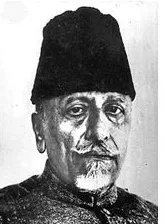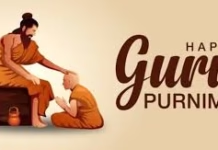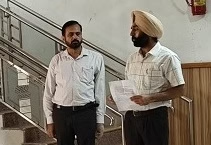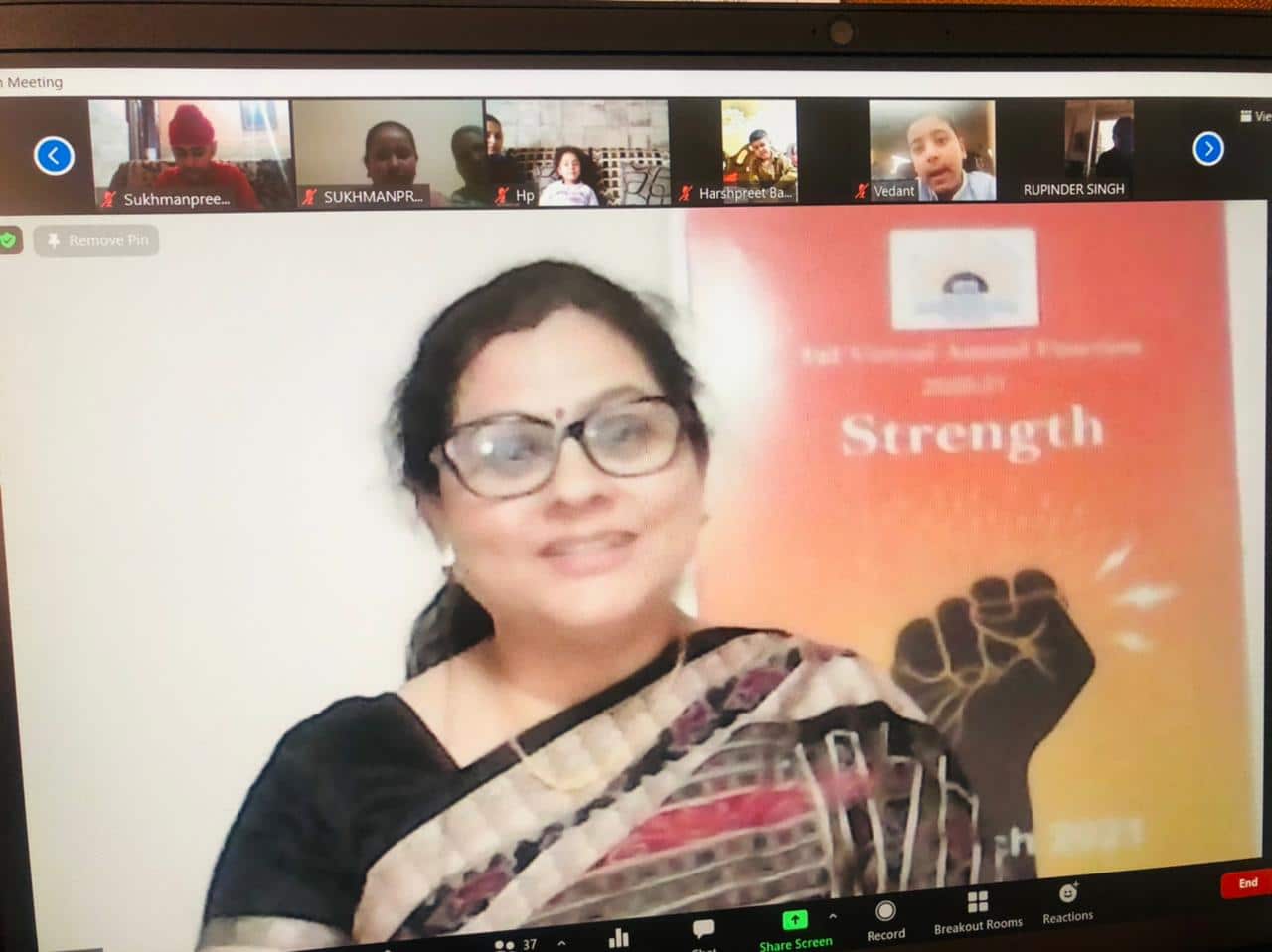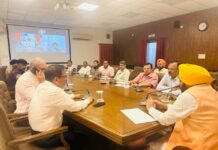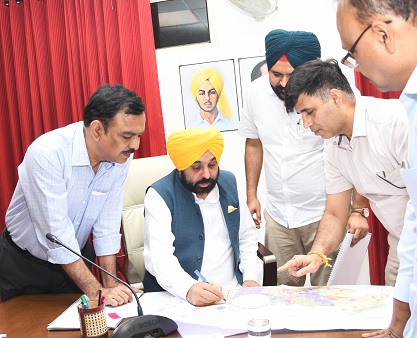A tribute to Maulana Abul Kalam Azad on his death anniversary-Puri
Jaswant Singh Puri / February 22,2023
Popularly known as Maulana Azad, he was born on November 11, 1888 in Mecca, Islam’s prestigious centre of pilgrimage. His full name was Abul Kalam Ghulam Muhiyuddin. He was the son of Muhammad Khairuddin and Alia Muhammad Khairuddin. Muhammad Khairuddin was a renowned Islamic scholar who brought up Azad under his tutelage in early years. At home, he studied a number of languages such as Persian, Urdu, Arabic, History and Philosophy. He received his education at home through books and tutors. Azad was married to Zulaikha Begum at the age of thirteen.
Azad’s birthday, 11th November is celebrated as National Education Day every year since 2008 to commemorate and honour him. He was a supporter of Hindu-Muslim unity and a staunch opponent of the country’s partition. He has left behind a lasting legacy in the field of India’s education. He was the First Education Minister of independent India. Intellectual par excellence, his life is a tribute to the importance of education. He also started writing at an early age and wrote poetry and articles. He penned his writings under the pen name ‘Azad’ which later became his identity.
Azad was a prolific reader and had mastered Islamic theology. In 1912, he kicked off publishing a weekly called ‘Al-Hilal’. The magazine got vast popularity among the public. But the Britishers banned it in 1914 under the Press Act. However, Azad continued with his another weekly ‘Al-Balagh’. The publication had a smooth run until he was booked under Defence of India Regulations in 1916. He was deported to Bihar until 1920. Still, he picked his courage and found strategies to rebel against the British through the power of his pen. He was a steadfast and ardent supporter of Indian nationalism.
Azad was associated with Aurobindo Ghosh and Shyam Sundar Chakravarty. He reinforced the Khilafat Movement. He also participated in the Non-cooperation Movement. He was a strong supporter of Mahatma Gandhiji’s views on non-violence and committed to the Civil Disobedience Movement. He also propagated the idea of Swaraj and Swadeshi Movement. In 1923, he was appointed the President of the Congress Party at the age of 35 only. He was an active and efficient leader of the party.
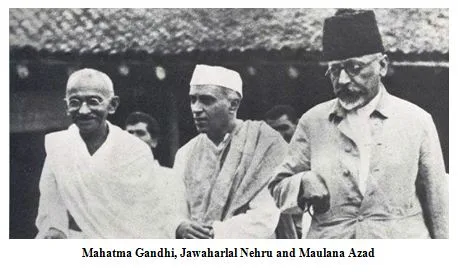
Azad believed in the unity of the nation with its diversity of inhabitants. Azad drew close to Mahatma Gandhi for his simple living. He started spinning his clothes using Khadi on the Charkha. He also came close to nationalists like Jawaharlal Nehru, Chitranjan Das and Subhash Chandra Bose. He also served as President of the 1924 Unity Conference in Delhi. He used his competency to unite the Swarajists and the Khilafat leaders under the common banner of the Congress. He favoured the ending of separate electorate and raised his voice for an independent India.
Azad took an active part in Salt Satyagraha in 1930 and he was arrested and imprisoned for a year and a half. He was set-free after the Gandhi-Irwin Pact of 1931. At the Congress Session in Lucknow in 1936, he approved the election of Nehru as Congress President. Being a true patriot, Azad travelled through the violence-affected regions of Bengal, Assam and Punjab and endeavoured ardently to establish refugee camps. Since he was a committed and caring worker, he ensured the supply of food and other essential items.
Azad was deeply devoted to the cause of education and his involvement in debates on education shaped many policies. He highlighted that India as a nation should soar high in educational standards. He was an intellectual and his fidelity for the realm of education is unparalleled due to his liberal and humanitarian approach to educational system. He had a novel idea for a fusion of eastern and western concepts to present integrated face to the educational system. Maulana Azad along with M.A. Ansari and Ajmal Khan founded the Jamila Milia Islamia in Aligarh. It was a higher educational institute managed exclusively by Indians.
Azad was a close confidante and advisor to Prime Minister Nehru. Azad masterminded and spearheaded the creation of national programmes of school and college construction. He ventured and worked to promote universal primary education. By virtue of his popularity and simplicity, he was elected to the Lok Sabha in 1952 and 1957. He was picked and chosen as President of the UNESCO General Conference held in Delhi in 1956.
Education always remained a salient issue for Azad. He established the board for Adult Education to facilitate education. He was the brain to create the Indian Council of Cultural Relations in 1950 to uplift cultural exchange with other nations. He played a pivotal role to establish Sahitya Academy, Sangeet Natak Academy, Lalit Kala Academy for the development of literature, music, dance and painting respectively.
Azad was the First Education Minister of independent India from 1947 to 1958. He championed for free and compulsory primary education for all children upto the age of 14 since he believed that it was the right of all citizens. He was also one of the brains behind the University Grants Commission.
Azad was a man of letters and wrote many books like India wins Freedom, Gubhar-e-Khatir, Tazkirah, Tarjumanul Quran etc. The scholar-politician passed away on 22nd February, 1958. He was posthumously conferred the Bharat Ratna, India’s highest civilian award. The Ministry of Minority Affairs of the Central Government of India setup the Maulana Azad Education Foundation in 1989 on the occasion of his birth centenary. A commemorative postage stamp in memory and honour of Maulana Abul Kalam Azad was issued on 11th November, 1988 on imported paper. People remember him as a path breaking thinker, a passionate educationist, a literary personality of intellectual aptitude, deftness and command.

Note: This article is dedicated to Smt. Alka Puri, M.A. wife of Dr. Ajit Singh Puri and mother of Jaswant Singh Puri.
(The views expressed are personal)

